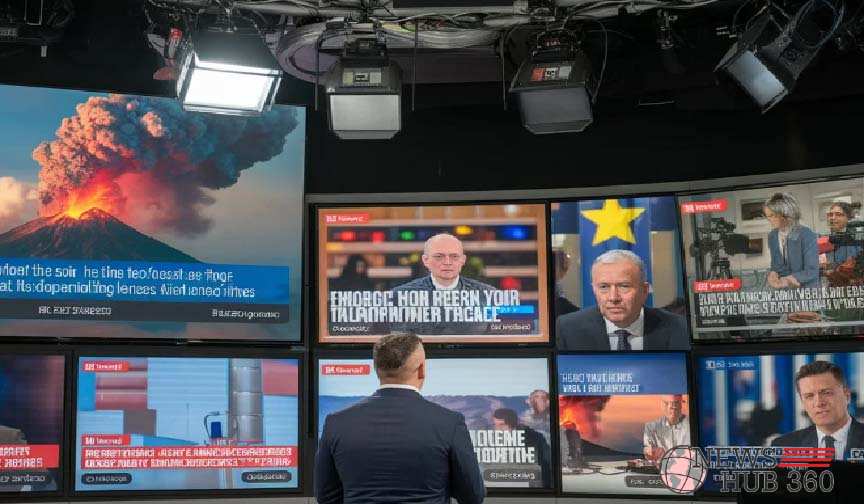What’s Happening in the World Today? Key Trends You Can’t Ignore
The pace of change in today’s world can feel overwhelming, but staying informed is crucial. From shifts in global politics to technological advancements, understanding the key developments shaping our future has never been more important. Here are some of the most significant trends you need to be aware of.
1. Political Landscape: A World in Transition
Across the globe, political environments are evolving rapidly. In the United States, the upcoming election cycle is drawing attention as candidates focus on key issues like healthcare, climate change, and the economy. Meanwhile, global events, such as the ongoing conflict in Ukraine, continue to impact international relations and geopolitical dynamics.
One of the major shifts occurring is the rise of populist movements. Many countries are seeing increased political polarization, with voters favoring more extreme candidates and policies. This trend is reshaping democracies and bringing about changes in how governments approach issues like immigration, trade, and social welfare.
The Impact of the Ukraine War
The conflict between Russia and Ukraine has had far-reaching effects beyond the battlefield. Economically, it has led to disruptions in global supply chains, particularly in energy and food sectors. The war has also prompted debates about NATO’s role and the future of European security. With ongoing tensions, this situation remains a significant driver of global instability.
2. Technological Disruption: Innovation at Breakneck Speed
Technology is advancing at an unprecedented rate, transforming industries and the way we live. Artificial intelligence (AI), automation, and data analytics are no longer just buzzwords—they’re actively changing the workforce, healthcare, education, and even our day-to-day lives.
- **Artificial Intelligence**: AI continues to revolutionize industries, from healthcare diagnostics to customer service. Companies are integrating AI-powered tools to improve efficiency and decision-making, but concerns around data privacy and job displacement persist.
- **Automation**: The rise of automation in manufacturing, logistics, and service industries has created a demand for new skills. Many routine jobs are being replaced by machines, prompting a shift toward roles requiring creativity, critical thinking, and technical expertise.
- **5G Networks**: With faster data speeds and lower latency, 5G is set to enhance everything from mobile connectivity to the Internet of Things (IoT). This technology promises to unlock new possibilities, particularly in sectors like autonomous vehicles and smart cities.
While technological advancements offer many benefits, they also present challenges. Ethical concerns around AI, the digital divide, and cybersecurity threats are just a few of the issues that will need to be addressed as we move further into the digital age.
3. Climate Change: An Urgent Call for Action
Climate change remains one of the most pressing challenges of our time. Extreme weather events, such as wildfires, hurricanes, and heatwaves, are becoming more frequent and intense due to global warming. Governments, corporations, and individuals are being urged to take immediate action to mitigate the effects of climate change.
One notable development is the increased focus on renewable energy. Countries are investing in solar, wind, and hydroelectric power to reduce reliance on fossil fuels. Meanwhile, the push for electric vehicles (EVs) is gaining momentum, with major automakers committing to phase out gasoline-powered cars in the coming decades.
Global Initiatives for Sustainability

In response to climate concerns, international bodies like the United Nations have set ambitious targets for reducing carbon emissions. The Paris Agreement, for instance, aims to limit global warming to below 2°C, but recent reports suggest that more drastic action is needed to meet this goal.
Individuals are also making changes, adopting more sustainable lifestyles by reducing waste, supporting eco-friendly businesses, and advocating for stronger environmental policies. However, the road to a sustainable future will require coordinated efforts across all sectors of society.
4. Shifts in Global Economies: Inflation and Supply Chain Issues
The global economy is facing significant challenges, with inflation, supply chain disruptions, and labor shortages causing widespread concern. The COVID-19 pandemic created ripple effects that are still being felt today, with many industries struggling to keep up with demand while grappling with rising costs.
In the U.S., inflation remains a hot-button issue as the Federal Reserve continues to adjust interest rates in an effort to curb rising prices. Meanwhile, global supply chains are facing unprecedented pressure due to shortages of key materials, including semiconductors and raw materials like lumber and steel.
The Future of Work
As economies adapt to the post-pandemic world, the future of work is changing. Remote work, once a temporary solution, is becoming a permanent fixture for many businesses. Companies are also experimenting with hybrid models, allowing employees to split their time between home and the office. These changes are reshaping urban centers, transportation systems, and even real estate markets as people reconsider where and how they live and work.
5. Social Movements: Calls for Equity and Justice
Social justice movements continue to gain traction, calling attention to issues of racial, gender, and economic inequality. The #MeToo movement, Black Lives Matter, and climate justice advocates have sparked widespread discussions and policy changes in recent years, particularly in the U.S. and Europe.
As these movements grow, they are influencing everything from corporate policies to government legislation. Companies are being held accountable for their diversity and inclusion practices, and governments are being urged to address systemic inequalities through policy reforms.
Increased Focus on Mental Health
Mental health awareness has surged in recent years, with many advocating for better access to care and reduced stigma. The pandemic exacerbated mental health challenges for millions, particularly among young people and frontline workers. Governments and healthcare organizations are beginning to address this issue with more resources and support, but there is still much work to be done in ensuring that mental health is prioritized on a global scale.
Conclusion: Navigating a Changing World
The world is in a state of flux, and staying informed about these key trends is essential for understanding where we’re headed. From technological innovations to social movements, the future is being shaped by a complex web of factors that will require adaptation and resilience. By keeping a close eye on these developments, we can better prepare for the challenges and opportunities that lie ahead.
For More More Visit, Newshub360


